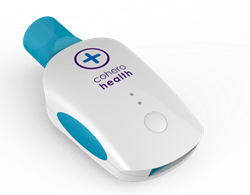Technologies developed by New York City-based digital medical health device company Cohero Health empower respiratory patients to actively engage in their own care. The Madison Avenue firm’s sensor-based technology and engaging gameplay platform improve medication adherence and care coordination between patients and their care providers.
Cohero Health is focused on developing connected health tools and technologies to improve respiratory care, and has now received 510(k) clearance from the FDA for its mobile spirometer, which automatically syncs real-time data to patients’ smartphones, allowing them to review and monitor their medical history and records of medication adherence and lung function. “Adherence to controller medication is essential for the proper treatment of asthma. I’m looking forward to seeing how Cohero’s technology of reminding and rewarding patients will improve adherence,” says Dr. Andrew Ting, Pediatric Pulmonologist at New York’s Mount Sinai Hospital, with which Cohero Health associates in research and development.
Cohero says its wireless mobile spirometer measures critical lung function metrics with the same precision as clinical-grade spirometers. The spirometer, paired with a smartphone or tablet, enables real-time health status measurement and reporting. Automation is paramount, and real-time data is securely and automatically pushed into patients’ electronic medical records, allowing physicians to make informed clinical decisions at the point of care. In addition, by collecting data on controller and rescue medication use, along with monitoring resulting changes in pulmonary function, Cohero is able to conduct predictive analytics in novel ways.
“At the patient-level, the platform enables identification of exacerbations and their causes before they occur. On a macro-level, it enables analysis of how patient populations use respiratory drugs, and the resulting effect on lung function,” says Cohero Health Co-founder and COO Daniel Weinstein MBA in a Mount Sinai release.
The device also integrates with Cohero Health’s mobile asthma and COPD disease management platform that includes bluetooth sensors that attach to a medication inhaler to track medication use and syncs wirelessly to the companion AsthmaHero mobile application. The app tracks adherence over time, generates customized reminders and provides a game experience that offers patients in-app and monetary rewards for consistently taking their medication as prescribed. AsthmaHero delivers engaging smartphone reminders via customized avatars and features a HeroPoints reward zone. With the mobile spirometer addition, Cohero Health becomes the first company to offer both lung function measurement and medication use tracking in an integrated connected health platform.
Cohero’s platform can also provide parents and caregivers of patients real time updates of patient medication use as well as weekly and monthly summary reports. The mobile spirometer tracks clinically relevant lung function measures between office visits.”Cohero is a result of my years of research in chronic respiratory care,” says Cohero Health co-founder and CEO Melissa Manice, PhD, MPH., a Post-Doctoral Fellow in the Department of Population Health Science and Policy at Mount Sinai Hospital. “Our platform was designed to address the hurdles to proper care and help reduce the overall cost of treating respiratory disease.”

“Chronic Obstructive Pulmonary Disease” (COPD) is the third leading cause of death in the U.S. after heart disease and cancer according to the Centers for Disease Control and Prevention. The American Lung Association notes that COPD, affects roughly 24 million Americans, is also a major cause of disability. While some 12 million have a formal COPD diagnosis. It is estimated that as many as 50 million Americans suffer to some degree from asthma and COPD — much of which is believed to be undiagnosed, and this number is growing.
Like “cancer,” COPD is a term encompassing a wide range of progressive conditions that result in or contribute to permanent lung damage that worsen over time. The disorder can affect patients’ airways, lung air sacs, or both. The two most prevalent and well-known COPD variants are chronic bronchitis and emphysema, both of which cause airway blockage that results in shortness of breath, chronic productive coughing that produces large amounts of mucus, chest tightness and/or wheezing and other symptoms. Labored breathing can limit an individual’s activity, inhibiting the patient from doing even basic activities like walking, cooking, or taking care of themselves, diminishing their quality of life and putting extra strain on the heart.
The leading cause of COPD is cigarette smoking. According to the National Institutes of Health, 42 percent of COPD sufferers are former smokers and 34 percent are current smokers. However, the rest — a substantial 24 percent — are persons who’ve never smoked, and it is believed that exposure to other lung irritants such as air pollution, chemical fumes, or dust, especially long term exposure, also may contribute to development of COPD.
COPD is typically diagnosed in middle-aged or older adults and develops slowly, with symptoms worsening over time. It is neither contagious nor communicable. There is no known COPD cure as yet, and no known means of reversing damage to the airways and lungs, However, the disease’s impact can be reduced through good management.
For example, continual monitoring of respiratory patients is critical, since exacerbations often lead to costly hospital stays, and can be deadly. Traditionally, lung function measurements have only been taken periodically, in clinic, but Cohero Health’s mobile spirometer now enables an unprecedented degree of remote, real-time monitoring. “We are enhancing respiratory care by recording critical measurements over time outside of a physician’s office,” says Dr. Manice in a release. “This longitudinal view of changes in lung function over time, in parallel with medication adherence tracking, equips physicians to partner with their patient to make more informed treatment decisions together. We’re really excited to be leading a new era of collaborative data driven clinical decisions.”
Cohero Health’s mobile spirometer connects via Bluetooth to Cohero Health’s pediatric and adult mobile applications, AsthmaHero and BreatheSmart respectively, to log and provide feedback on results. These applications also deliver customized medication reminders to patients, and track use of both maintenance and rescue medication via Cohero Health’s HeroTracker medication sensors. Cohero Health then tracks and analyzes the effects on lung function of maintenance and rescue medication use, along with external triggers. This data can be integrated into clinical workflows, to empower decision making at point of care, or as a long-term patient monitoring tool.
The Cohero Health platform has been deployed in closed pilots in healthcare systems. Early results have shown a 2.5 times increase in medication adherence, and 100% reduction in hospitalizations. The company is expanding to additional pilots ahead of full commercial launch of their full platform later this year.
“The inclusion of a mobile spirometer in our platform allows stakeholders to track, for the first time ever, how patients are using their medication, and how they are responding to their medication, in real-time,” says Mr. Weinstein. “Through robust tracking, motivating better behaviors, and early identification of potential acute events, the Cohero Health platform enables better patient management, red k flow, such as Forced Vital Capacity (FVC), Forced Expiratory Volume (FEV1), the speed and volume of breath over time. These measurements provide a much more accurate picture of lung health, and allow both patients and their providers to understand if they are at risk of an attack.
The Department of Population Health Science and Policy at the Icahn School of Medicine at Mount Sinai has conducted an investigational pilot study of Cohero Health’s respiratory disease management platform in pediatric asthma patients seen in two high volume pediatric clinics at the Mount Sinai Health System. Study participants used Cohero’s platform that connects devices and a game-based mobile app to increase and monitor adherence to asthma medication. The Cohero Health team worked closely with the Center for Technology Innovation and Entrepreneurship (C-TIE) at Mount Sinai Health System in developing its platform and bringing it to market.
Cohero Health is also a participant in StartUp Health, Springboard Enterprises, and Grand Central Tech startup accelerator programs. For more information, visit: http://www.coherohealth.com
Sources:
Cohero Health
Mount Sinai Health System
The Icahn School of Medicine at Mount Sinai
Centers for Disease Control and Prevention
National Institutes of Health
Image Credits:
Cohero Health
Mount Sinai Health System

